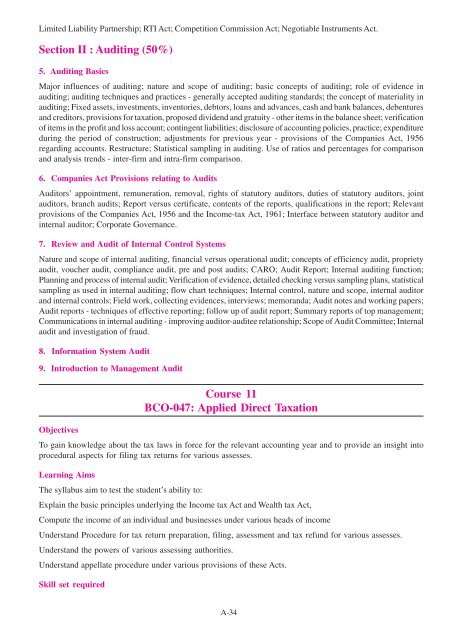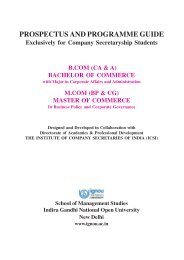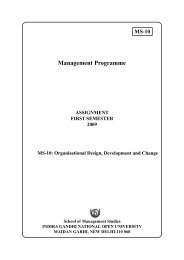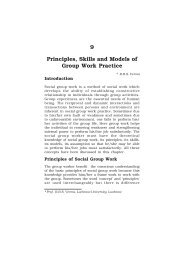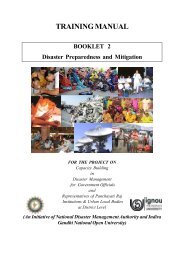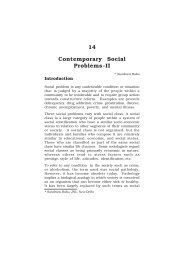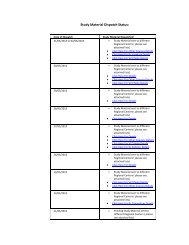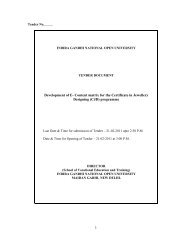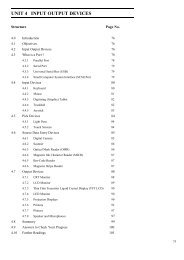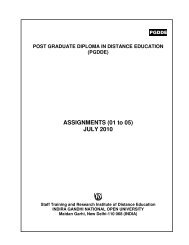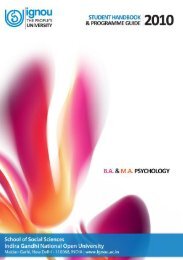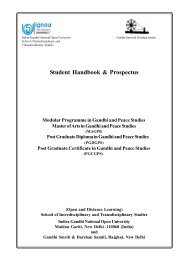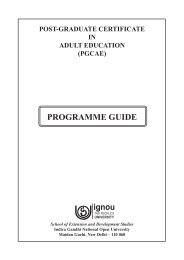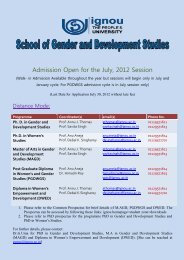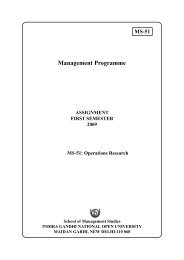PROSPECTUS AND PROGRAMME GUIDE - IGNOU
PROSPECTUS AND PROGRAMME GUIDE - IGNOU
PROSPECTUS AND PROGRAMME GUIDE - IGNOU
Create successful ePaper yourself
Turn your PDF publications into a flip-book with our unique Google optimized e-Paper software.
Limited Liability Partnership; RTI Act; Competition Commission Act; Negotiable Instruments Act.<br />
Section II : Auditing (50%)<br />
5. Auditing Basics<br />
Major influences of auditing; nature and scope of auditing; basic concepts of auditing; role of evidence in<br />
auditing; auditing techniques and practices - generally accepted auditing standards; the concept of materiality in<br />
auditing; Fixed assets, investments, inventories, debtors, loans and advances, cash and bank balances, debentures<br />
and creditors, provisions for taxation, proposed dividend and gratuity - other items in the balance sheet; verification<br />
of items in the profit and loss account; contingent liabilities; disclosure of accounting policies, practice; expenditure<br />
during the period of construction; adjustments for previous year - provisions of the Companies Act, 1956<br />
regarding accounts. Restructure; Statistical sampling in auditing. Use of ratios and percentages for comparison<br />
and analysis trends - inter-firm and intra-firm comparison.<br />
6. Companies Act Provisions relating to Audits<br />
Auditors’ appointment, remuneration, removal, rights of statutory auditors, duties of statutory auditors, joint<br />
auditors, branch audits; Report versus certificate, contents of the reports, qualifications in the report; Relevant<br />
provisions of the Companies Act, 1956 and the Income-tax Act, 1961; Interface between statutory auditor and<br />
internal auditor; Corporate Governance.<br />
7. Review and Audit of Internal Control Systems<br />
Nature and scope of internal auditing, financial versus operational audit; concepts of efficiency audit, propriety<br />
audit, voucher audit, compliance audit, pre and post audits; CARO; Audit Report; Internal auditing function;<br />
Planning and process of internal audit; Verification of evidence, detailed checking versus sampling plans, statistical<br />
sampling as used in internal auditing; flow chart techniques; Internal control, nature and scope, internal auditor<br />
and internal controls; Field work, collecting evidences, interviews; memoranda; Audit notes and working papers;<br />
Audit reports - techniques of effective reporting; follow up of audit report; Summary reports of top management;<br />
Communications in internal auditing - improving auditor-auditee relationship; Scope of Audit Committee; Internal<br />
audit and investigation of fraud.<br />
8. Information System Audit<br />
9. Introduction to Management Audit<br />
Objectives<br />
Course 11<br />
BCO-047: Applied Direct Taxation<br />
To gain knowledge about the tax laws in force for the relevant accounting year and to provide an insight into<br />
procedural aspects for filing tax returns for various assesses.<br />
Learning Aims<br />
The syllabus aim to test the student’s ability to:<br />
Explain the basic principles underlying the Income tax Act and Wealth tax Act,<br />
Compute the income of an individual and businesses under various heads of income<br />
Understand Procedure for tax return preparation, filing, assessment and tax refund for various assesses.<br />
Understand the powers of various assessing authorities.<br />
Understand appellate procedure under various provisions of these Acts.<br />
Skill set required<br />
A-34


